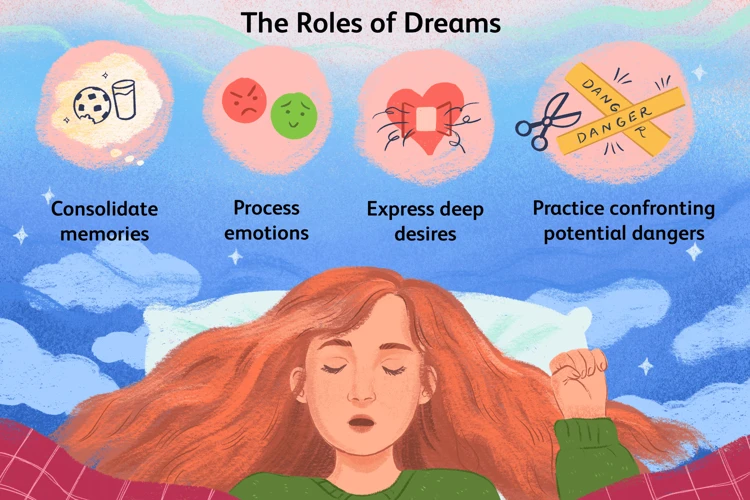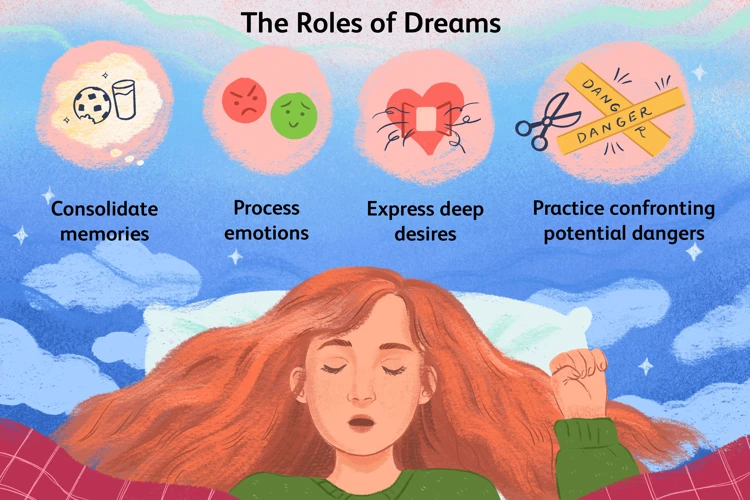Have you ever woken up in a cold sweat, heart pounding, after experiencing the sensation of falling in your dreams? Falling nightmares are a common phenomenon that can leave us feeling bewildered and disturbed. But what do these dreams really mean? In this article, we will explore the hidden messages behind falling nightmares and unravel the symbolism they hold. From theories behind the fear of losing control to the various interpretations of falling dreams, we will delve into the emotions associated with these nightmares and how they can be interpreted in different contexts. So, fasten your seatbelts as we embark on a journey to decode the meaning of falling in your dreams step-by-step.
What Are Falling Nightmares?

Falling nightmares refer to a type of dream where the dreamer experiences the sensation of falling. These dreams can be characterized by a variety of scenarios, such as falling from a great height, falling endlessly, or sudden jolts that wake the dreamer up. The sense of falling can be accompanied by feelings of fear, anxiety, or even excitement. Falling nightmares are quite common and can be experienced by people of all ages and backgrounds. While the exact cause of falling nightmares is not fully understood, psychologists have developed several theories to explain their occurrence. These theories range from the fear of losing control to feelings of insecurity and lack of stability. By analyzing the symbolism and variations of falling dreams, we can gain insights into the deeper meanings they hold. So, let’s dive further into the mysterious world of falling nightmares and unravel their hidden messages.
Theories Behind Falling Nightmares

There are several theories that attempt to explain the occurrence of falling nightmares. One theory suggests that falling dreams stem from the fear of losing control. When we experience a lack of control in our waking lives, it can manifest in our dreams as the sensation of falling. This theory emphasizes the importance of maintaining a sense of control and autonomy in our daily lives to mitigate the occurrence of falling nightmares. Another theory links falling dreams to feelings of insecurity and lack of stability. These dreams may arise during times of transition or when we are faced with uncertain situations. The sense of falling represents our subconscious fears of not being able to maintain stability or security in our lives. By understanding these theories behind falling nightmares, we can gain insight into the deeper psychological meaning behind these dreams. To explore other common nightmares, such as encounters with monsters, late or missing important events, or being chased, check out Understanding Common Nightmares: Being Chased for further analysis.
1. The Fear of Losing Control
The fear of losing control is one of the theories behind falling nightmares. When we experience a sensation of falling in our dreams, it can reflect a deep-seated fear of losing control in our waking lives. This fear may stem from various sources, such as a lack of control over our circumstances, relationships, or even our own emotions. The feeling of helplessness that often accompanies falling dreams can be a manifestation of this fear. It may indicate a sense of powerlessness in facing challenges or making decisions. This fear of losing control can be linked to other common nightmares, such as being chased or being trapped. These dreams may allude to a general fear of being unable to escape or find stability in our waking lives. By examining the root causes of this fear, we can gain a better understanding of ourselves and work towards regaining a sense of control. If you’re interested in learning more about decoding common nightmares, you can check out our article on cracking the code of common nightmares involving monsters.
2. Insecurity and Lack of Stability
Insecurity and a lack of stability are common theories behind falling nightmares. These dreams may symbolize the dreamer’s feelings of insecurity and instability in their waking life. When we experience a sense of falling in our dreams, it can reflect a deep-seated fear of losing control or a lack of stability in various aspects of life. This could be related to personal relationships, work, or even general life circumstances. The feeling of instability in one’s life can manifest as a recurring theme in falling nightmares. The dreamer may feel as though they are constantly on the edge, unable to find solid ground or security. Interestingly, these feelings of insecurity and instability can often be traced back to real-life experiences or situations that evoke similar emotions. For example, a person going through a tumultuous relationship or facing financial difficulties may find themselves having falling nightmares as a reflection of their fears and uncertainties. Exploring these underlying concerns and addressing them in waking life can help alleviate the frequency and intensity of falling nightmares. If you’d like to learn more about analyzing common nightmares related to missing important events, you can check out our previous article here.
The Symbolism of Falling Dreams

The symbolism of falling dreams is rich and varied, offering us a glimpse into our subconscious minds. One common interpretation of falling dreams is vulnerability and fear of failure. These dreams may reflect our anxieties about losing control and the potential consequences of our actions. Another possible symbolism of falling dreams is the idea of letting go and surrender. Falling can represent a release from burdens or a need to relinquish control and trust in the flow of life. It can be a reminder to embrace change and not resist the natural course of events. Falling dreams can also signify transformation and personal growth. Just as a seed must fall to the ground in order to sprout and grow, falling dreams can be a sign of positive change and the potential for self-improvement. The symbolism of falling dreams is subjective and can vary depending on individual experiences and emotions. To gain a better understanding of the specific meanings behind your falling dreams, it can be helpful to reflect on your personal context and feelings associated with the dream.
1. Vulnerability and Fear of Failure
Vulnerability and fear of failure are common themes associated with falling dreams. These dreams can signify the dreamer’s feelings of vulnerability and the fear of not meeting expectations or failing in some aspect of their life. The sensation of falling can evoke a sense of powerlessness and a fear of losing control, symbolizing the uncertainties and challenges that the dreamer may be facing in their waking life. Falling dreams can also reflect a fear of taking risks or stepping out of one’s comfort zone, as the act of falling represents a loss of stability and security. It is important to note that these dreams are not necessarily negative, but rather, they provide an opportunity for self-reflection and growth. They serve as a reminder to confront and overcome fears, embrace vulnerability, and strive for personal development and resilience. By acknowledging and addressing these underlying fears, individuals can gain a deeper understanding of themselves and work towards overcoming their insecurities.
2. Letting Go and Surrender
One of the symbolic interpretations of falling dreams is the concept of letting go and surrender. When we dream of falling, it can symbolize our subconscious desire to release control and surrender to the flow of life. This interpretation suggests that our dreams are urging us to relinquish our need for control and trust in the process of life itself. Just like when we fall, we have no control over the direction or outcome of the descent, dreams of falling can reflect our need to embrace the unknown and surrender to whatever life has in store for us.
In these dreams, the feeling of helplessness and vulnerability can be overpowering, but it’s important to remember that it is often in moments of surrender that we find true freedom and growth. Falling dreams can serve as a reminder to let go of our need for control and surrender to the natural course of events.
To fully embrace the symbolic meaning of letting go and surrender in falling dreams, it can be helpful to engage in practices like meditation or mindfulness. These practices encourage us to release our attachment to outcomes and embrace the present moment. By practicing surrender in our waking lives, we can find greater peace and contentment in the face of uncertainty.
It’s interesting to note that the interpretation of letting go and surrender in falling dreams can vary depending on the individual and their personal experiences. While some may find these dreams terrifying, others may interpret them as an invitation to trust the process of life and let go of their fears. It’s important to explore our own emotions and associations with falling dreams to fully understand their personal significance.
Falling dreams that symbolize letting go and surrender serve as a reminder to loosen our grip on control and embrace the unknown. By surrendering to the flow of life, we can find freedom and personal growth. So, the next time you find yourself experiencing a falling dream, remember to surrender and trust that everything will unfold as it should.
3. Transformation and Personal Growth
Transformation and personal growth are key themes associated with falling dreams. In these dreams, the sensation of falling can represent a metaphorical journey of transformation and self-discovery. It signifies the process of letting go of old beliefs, habits, or patterns that no longer serve us and embracing change. Falling can be seen as a necessary step in the process of personal growth, as it often requires us to confront our fears and step out of our comfort zones. These dreams suggest that we are in a period of transition, where we are shedding our old selves and making way for new possibilities. They encourage us to embrace the unknown and trust in our ability to navigate through life’s challenges. Falling dreams of this nature can be seen as a reminder to embrace transformation and view it as an opportunity for growth rather than something to be feared. So, if you find yourself experiencing falling dreams that evoke a sense of transformation and personal growth, consider it as a positive sign that you are on the path towards self-discovery and evolution.
Common Variations of Falling Nightmares

Falling nightmares come in various forms, each with its own distinct variations. One common variation is the sensation of endless falling, where the dreamer feels as though they are continuously plummeting without any sign of reaching the ground. This dream can evoke a sense of helplessness and powerlessness, as the dreamer feels trapped in a seemingly never-ending descent. Another variation is characterized by sudden jolts that abruptly wake the dreamer up. These jolts can create a sense of panic and confusion, as the dreamer is startled back to reality. Lastly, some falling nightmares involve the dreamer falling from great heights, such as a tall building or a cliff. These dreams often reflect a fear of losing balance or control in one’s waking life. Each variation of falling nightmares carries its own unique emotional impact, shedding light on the underlying fears and anxieties of the dreamer.
1. Endless Falling
Endless falling is a common variation of falling nightmares that can leave the dreamer feeling trapped and helpless. In this type of dream, the sensation of falling persists without any end in sight. The dreamer may feel as though they are endlessly plummeting through space or a bottomless void. This type of dream often evokes intense feelings of fear, anxiety, and powerlessness. Endless falling can be interpreted as a reflection of the dreamer’s perceived lack of control or stability in their waking life. It may signify a sense of being overwhelmed by circumstances or a fear of losing direction and purpose. The dreamer may find themselves desperately searching for a way to stop the fall or regain control, but all efforts seem futile. It is important to explore the emotions associated with endless falling nightmares and to identify any underlying issues that may be causing this recurring dream. Understanding the symbolism and personal significance of this dream variation can provide valuable insights into the dreamer’s fears and challenges, ultimately leading to personal growth and resolution.
2. Sudden Jolts and Waking Up
Sudden jolts and waking up are common variations of falling nightmares. In these dreams, the individual may experience a sudden drop or fall, followed by a jolt that wakes them up abruptly. This can be a particularly unsettling experience, as the dreamer is jolted out of their sleep and brought back to reality. The sensation of falling coupled with the sudden awakening can leave a lingering sense of unease and confusion. These dreams often occur during stages of deep sleep, such as during REM (rapid eye movement) sleep, which is when most of our dreaming occurs. The jolt that accompanies waking up from a falling dream may be attributed to the body’s natural response to the perception of danger. This is known as a hypnic jerk, which is an involuntary muscle spasm that can occur when transitioning from a state of sleep to wakefulness. While these sudden jolts and waking up experiences in falling nightmares can be disturbing, they are a normal occurrence and not necessarily indicative of any underlying issue. It is important to remember that dreams are a product of our subconscious mind and can often be influenced by our daily experiences, emotions, and anxieties.
3. Falling From Heights
is a specific variation of falling nightmares that involves the dreamer plummeting from a great height. This type of dream often triggers intense feelings of fear and vulnerability. The sensation of falling from heights can symbolize a lack of control in one’s life or a fear of failure. It may also reflect a deep-seated insecurity or a sense of being overwhelmed by the challenges and expectations placed upon oneself. In these dreams, the height from which one falls can vary, ranging from tall buildings or cliffs to airplanes or even outer space. The vividness and intensity of the dream can amplify the emotions experienced during the fall. The dreamer may feel a rush of adrenaline or a sense of impending doom as they descend rapidly. It is important to note that falling from heights in dreams does not necessarily predict an actual physical fall or disaster in one’s waking life. Rather, it serves as a powerful metaphor for the emotional and psychological struggles that the individual may be facing. Understanding the specific context and personal experiences of the dreamer can provide further insights into the meaning behind falling from heights in their nightmares.
Understanding the Emotions Associated with Falling Dreams

Falling dreams evoke a range of powerful emotions within us, each offering a unique insight into our subconscious. Fear and anxiety often accompany these dreams, as the sensation of falling can trigger feelings of vulnerability and uncertainty. The fear of hitting the ground or being unable to regain control can amplify these emotions. However, falling dreams can also evoke helplessness and powerlessness, as we find ourselves unable to prevent or stop the descent. These dreams can reflect a lack of control or a sense of being overwhelmed by circumstances in our waking life. On the other hand, falling dreams can also bring a sense of excitement and freedom. The adrenaline rush that comes with falling can be perceived as a thrill, symbolizing a desire for liberation, taking risks, or embracing new experiences. Understanding the emotions associated with falling dreams can provide valuable insights into our fears, desires, and personal growth.
1. Fear and Anxiety
Fear and anxiety are common emotions associated with falling dreams. When we experience the sensation of falling in our dreams, it can trigger a sense of fear and panic. This is because falling represents a loss of control and a potential threat to our safety. The experience of free-falling without any means of stopping or slowing down can be incredibly unnerving. The fear and anxiety may stem from a deeper psychological fear of losing control in our waking lives. It could be a reflection of the stress and pressure we feel in certain situations, such as work or personal relationships. It’s important to pay attention to the specific context and emotions within the dream to gain a better understanding of what is causing the fear and anxiety. These dreams serve as a reminder to address and confront our fears, allowing us to find ways to regain a sense of control and security in our waking lives.
2. Helplessness and Powerlessness
Helplessness and powerlessness are common emotions associated with falling dreams. When we dream of falling, we often have no control over the situation and feel completely helpless. This feeling of helplessness can translate into our waking lives, where we may experience a lack of control or agency in certain areas. Falling dreams can serve as a reminder of the areas in our lives where we feel powerless or unable to take charge. These dreams may indicate that we need to regain a sense of control or find ways to assert ourselves in order to overcome feelings of helplessness. Additionally, falling dreams can also reflect a perceived loss of power or influence in relationships or situations. They may be a sign that we need to assert ourselves, set boundaries, or reassess the dynamics of our relationships. By acknowledging and addressing these feelings of helplessness, we can work towards reclaiming our power and taking control of our lives.
3. Excitement and Freedom
Excitement and freedom are emotions that can be associated with falling dreams. While falling nightmares are often accompanied by fear and anxiety, there are instances where the sensation of falling can elicit feelings of excitement and freedom. In these dreams, the act of falling becomes less about the fear of physical danger and more about the exhilarating sense of letting go and embracing the unknown. The dreamer may feel a rush of adrenaline and a sense of liberation as they surrender to the descent. This can be interpreted as a representation of the dreamer’s desire for change and adventure in their waking life. The excitement and freedom experienced in falling dreams may signify a longing for new experiences, breaking free from limitations, and embracing the unknown. These dreams can serve as a reminder for individuals to take risks, step out of their comfort zone, and pursue their passions with a sense of enthusiasm and zeal. It is important to note that the interpretation of falling dreams can vary depending on the individual’s personal experiences and associations. It is crucial to consider the context of the dreamer’s life and emotions to fully understand the meaning of excitement and freedom in their falling dreams.
Interpreting Falling Dreams in Different Contexts

When it comes to interpreting falling dreams, understanding them in different contexts can provide valuable insights into our subconscious mind. In the context of relationships and love life, falling dreams may signify a fear of losing control or the fear of failure. It could reflect a sense of vulnerability and the need for security and stability. In the context of career and ambitions, falling dreams may symbolize a fear of failure or a lack of confidence in one’s abilities. It could be a reminder to reassess goals and make necessary adjustments. Falling dreams in the context of personal challenges and fears could represent a need for personal growth and transformation. It might indicate a need to let go of old patterns and embrace new beginnings. It’s important to analyze the emotions and specific circumstances surrounding the falling dream to gain a deeper understanding of its interpretation in various contexts.
1. Relationship and Love Life
When it comes to falling dreams and their interpretation in the context of relationships and love life, it’s important to consider the dynamics and emotions involved. Falling dreams in this context can symbolize vulnerability and fear of failure. If you find yourself falling in a dream while thinking about your relationships, it may indicate a sense of insecurity or uncertainty. It could represent a fear of losing control over the relationship or the fear of things falling apart. Falling dreams can also signify the need to let go of old patterns or past hurts in order to move forward in love. It may be a sign that you need to surrender to the process of love and trust that things will work out. Alternatively, falling dreams in the context of relationships can signify personal growth and transformation. They may be a reflection of your willingness to take risks and explore new experiences in love. It could denote a desire for excitement and freedom within the relationship. Falling dreams in the realm of relationships and love life provide insight into your emotional state, fears, and desires within romantic connections.
2. Career and Ambitions
When it comes to interpreting falling dreams in the context of career and ambitions, there are several key aspects to consider. Firstly, falling in relation to career and ambitions can symbolize a fear of failure or a lack of confidence in one’s abilities. The dreamer may be experiencing doubts and insecurities about their professional capabilities and feel as if they are on the verge of losing control or falling behind in their career trajectory. This can stem from a fear of not meeting expectations or not being able to keep up with the demands of their chosen path. Additionally, falling dreams in this context can also represent a desire for change or a need to let go of old goals and aspirations. The dreamer may be sensing a need to reevaluate their current career path and make adjustments to align with their true passions and values. This can be a transformative process that leads to personal growth and a renewed sense of purpose. Ultimately, falling dreams related to career and ambitions serve as a reminder to embrace vulnerability, confront fears, and take proactive steps towards building a fulfilling professional life.
3. Personal Challenges and Fears
Personal challenges and fears play a significant role in the interpretation of falling dreams. These dreams often reflect the fears and anxieties we have about facing and overcoming obstacles in our personal lives. The sensation of falling can represent a sense of vulnerability and the fear of failure. It may reflect the challenges and uncertainties associated with taking risks or stepping out of our comfort zones. Falling dreams in this context can serve as a reminder to confront our fears and address the personal hurdles that may be holding us back. These dreams can also be a symbol of the need for personal growth and transformation. By embracing the symbolism of falling, we can embrace the opportunity for change and self-improvement. It is essential to pay attention to the emotions and circumstances surrounding falling dreams within the context of our personal challenges and fears. By doing so, we can gain valuable insight into the steps we need to take to overcome obstacles and achieve personal growth.
Tips to Overcome Falling Nightmares
When it comes to overcoming falling nightmares, there are several strategies that can help alleviate the distressing experiences. Keeping a dream journal is a useful practice as it allows you to record and reflect on your dreams, including any recurring themes or patterns related to falling. This can help you identify triggers and gain a better understanding of your emotions. Another effective tip is to embrace vulnerability and acceptance. Recognize that falling dreams are often symbolic and don’t necessarily represent actual danger. By cultivating self-compassion and accepting the emotions that arise during these dreams, you can lessen the fear and anxiety associated with them. Additionally, seeking support from friends, family, or professional help can provide valuable guidance and coping mechanisms to manage falling nightmares. Remember, everyone’s experience with dreams is unique, and finding what works best for you may require some experimentation.
1. Keep a Dream Journal
- Keep a Dream Journal: One effective way to overcome falling nightmares is to keep a dream journal. The same way keeping a dream journal can help analyze common nightmares with monsters, it can also provide valuable insights into falling dreams. By recording your dreams immediately upon waking, you can capture details, emotions, and any recurring patterns or themes related to your falling nightmares. This practice helps in enhancing your self-awareness and aids in understanding the underlying emotions and triggers associated with these dreams. Keep a notebook or use a dream journal app to document your dreams regularly, and don’t forget to jot down any personal interpretations or connections you make with your waking life.
2. Embrace Vulnerability and Acceptance
Embracing vulnerability and acceptance is a crucial step in overcoming falling nightmares. These dreams often stem from deep-rooted fears and anxieties, and by embracing vulnerability, we can begin to understand and address these underlying emotions. It’s important to recognize that vulnerability is not a weakness, but rather a strength that allows us to connect with ourselves and others on a deeper level. By accepting our fears and insecurities, we can start the process of healing and growth. One way to embrace vulnerability is by practicing self-compassion. Treat yourself with kindness and understanding, just as you would a close friend. Allow yourself to feel and acknowledge your emotions without judgment. Another powerful tool is practicing mindfulness and staying present in the moment. Mindfulness helps us to observe our thoughts and feelings without getting caught up in them, allowing us to create a sense of inner peace and stability. Additionally, seeking support from loved ones or even professional help can provide a safe space to explore and process our fears. Remember, embracing vulnerability and acceptance is a process that takes time and effort, but it can lead to profound personal transformation and a reduction in falling nightmares.
3. Seek Support and Professional Help
Seeking support and professional help can be beneficial for individuals who frequently experience falling nightmares and find it difficult to cope with the emotions and disturbances caused by these dreams. Here are some options to consider:
1. Talking to a therapist or counselor: A trained professional can help you explore the underlying reasons behind your falling nightmares and provide guidance on how to manage them. They can assist you in developing coping strategies and offer techniques to regulate your emotions.
2. Joining a support group: Connecting with others who have similar experiences can provide a sense of validation and understanding. Support groups can offer a safe space to share your dreams, gain insights from others, and learn effective ways to deal with falling nightmares.
3. Alternative therapies: Some individuals find relief from falling nightmares through alternative therapies such as hypnotherapy, guided imagery, or relaxation techniques. These approaches can help calm the mind, reduce anxiety, and promote better sleep.
4. Improving sleep hygiene: Establishing a consistent sleep routine and creating a relaxing environment before bedtime can contribute to better sleep quality and potentially reduce the occurrence of nightmares.
Remember, it is essential to seek professional guidance if your falling nightmares significantly impact your daily life, cause severe distress, or if you suspect an underlying psychological condition. A qualified mental health professional can provide personalized assessment and appropriate interventions to support your well-being.
Conclusion
In conclusion, falling nightmares hold significant meaning and can offer valuable insights into our subconscious thoughts and emotions. The sensation of falling in dreams can be associated with various fears and insecurities, such as the fear of losing control, insecurity, and lack of stability. However, falling dreams can also symbolize vulnerability, letting go, and personal growth. The emotions experienced during falling nightmares, including fear, anxiety, helplessness, and even excitement, provide clues to our deepest desires and concerns. These dreams can be interpreted in different contexts, such as relationships, career, and personal challenges, offering guidance and self-reflection. To overcome falling nightmares, keeping a dream journal can aid in identifying patterns and triggers, while embracing vulnerability and seeking professional help can provide valuable support. By understanding and decoding the meaning of falling nightmares, we can gain a deeper understanding of ourselves and navigate our waking lives with more awareness and insight.
Frequently Asked Questions
1. Why do falling nightmares feel so realistic?
Falling nightmares often feel realistic because they tap into our innate fear of losing control. During sleep, our brain can create vivid and immersive dream experiences that mimic real-life sensations, which can make the experience of falling in a dream feel incredibly lifelike.
2. Can falling nightmares be a reflection of real-life fears?
Yes, falling nightmares can often be a manifestation of real-life fears and anxieties. The sensation of falling in dreams can symbolize a fear of failure, a lack of stability, or the fear of letting go. By exploring the deeper emotions associated with falling dreams, we can gain insights into our subconscious fears and concerns.
3. Are falling nightmares more common in certain age groups?
Falling nightmares can occur in people of all ages, but they may be more prevalent in certain age groups. Children, for example, may experience falling nightmares as they navigate new experiences and fears, while adults may have falling dreams related to career pressures or personal challenges.
4. Can recurring falling nightmares have a lasting impact on our well-being?
Recurring falling nightmares can have a temporary impact on our well-being, leading to disrupted sleep and increased anxiety upon waking up. However, for the majority of people, these dreams do not have long-lasting effects on mental health. If you are concerned about the impact of recurring nightmares, it is best to consult with a mental health professional.
5. How can falling nightmares be interpreted as a positive symbol?
While falling nightmares are often associated with negative emotions, they can also be seen as symbols of personal growth and transformation. The sensation of falling can represent a release of control and the ability to let go of fears or limitations. It can be a sign that you are ready to embrace change and embark on a new journey.
6. Are there any cultural or religious interpretations of falling dreams?
Yes, different cultures and religions may have their own interpretations of falling dreams. For example, in some Native American cultures, falling dreams are seen as a sign of the soul traveling between realms, while in certain religious contexts, falling dreams can symbolize spiritual purification or a loss of faith. It is important to consider one’s own cultural and personal beliefs when interpreting falling dreams.
7. Can analyzing falling nightmares help us overcome our fears?
Absolutely. By analyzing falling nightmares, we can gain a deeper understanding of our fears and anxieties, allowing us to confront and overcome them. Recognizing the symbolism and emotions associated with falling dreams can provide valuable insights for personal growth and self-improvement.
8. Are there any techniques to cope with the fear of falling nightmares?
There are several techniques that can help cope with the fear of falling nightmares. Keeping a dream journal can aid in understanding recurring patterns and triggers. Practice relaxation techniques before bed, such as deep breathing or meditation, to promote a sense of calm. Seeking support from loved ones or a professional counselor can also be helpful in navigating and overcoming the fear.
9. Can medications or supplements help reduce falling nightmares?
While there isn’t a specific medication or supplement that targets falling nightmares, addressing underlying issues such as anxiety or sleep disorders could potentially reduce the occurrence of these dreams. Consulting with a healthcare professional can help determine if any intervention is necessary or beneficial.
10. When should falling nightmares be cause for concern?
Falling nightmares are generally considered a normal part of dreaming, but if they significantly disrupt your sleep, cause excessive distress, or are accompanied by other symptoms of mental health conditions, it may be worth seeking professional help. A healthcare provider or mental health specialist can provide guidance and support in understanding and managing falling nightmares.








